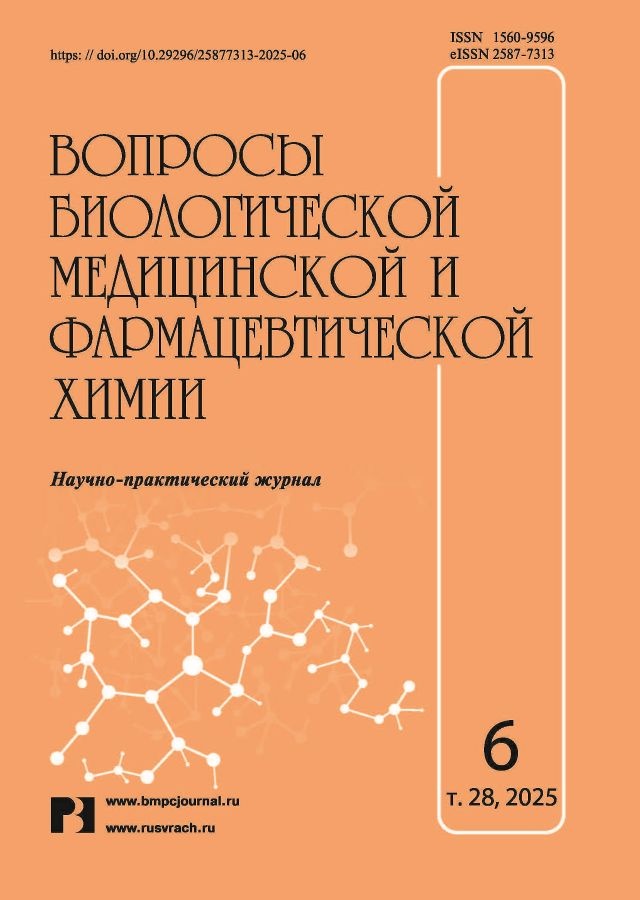Lecithin membranes as biological models for evaluating drug release
- Authors: Kaisheva N.S.1
-
Affiliations:
- Volgograd State Medical University of the Ministry of Health of the Russian Federation
- Issue: Vol 28, No 6 (2025)
- Pages: 5-13
- Section: Biological chemistry
- URL: https://journals.eco-vector.com/1560-9596/article/view/685473
- DOI: https://doi.org/10.29296/25877313-2025-06-01
- ID: 685473
Cite item
Abstract
Introduction. The most popular and affordable method for assessing the degree of drug release (DR) is the method of dialysis through a semipermeable membrane, the effectiveness of which is determined by the choice of a suitable membrane. With various positive aspects of the use of natural and synthetic membranes, their use has a number of limitations, the main of which for natural membranes are differences in lipid composition depending on the type of animal and even skin areas, for synthetic membranes – the exclusion of the influence of DR interaction processes. Considering that phospholipids and cholesterol form the basis of cell membranes, and lecithin is a similar combined compound, it seems possible to create model membranes based on lecithin.
The aim of the study was to create lecithin membranes similar in functional properties to natural membranes, but with optimal physico-chemical parameters, simplicity and accessibility of manufacture, and a comparative assessment of the degree of release of acidic polysaccharides (beet pectin, sodium alginate) through lecithin membranes.
Material and methods. Lecithin membranes are obtained by impregnating dense fine-porous paper filters "blue ribbon" with a diameter of 5.0–20.0 cm in a 6.3% solution of lecithin in 95% ethanol for 48 hours.
Results. Comparable results of determining the reduced degree of dialysis of polysaccharides through lecithin membranes in comparison with the parietal sheet of the rat peritoneum, the use of isotonic sodium chloride solution and physiological temperature make it possible to simulate the conditions as much as possible in vivo in the study of the bioavailability of DR.
Conclusion. Lecithin membranes are characterized by high porosity, minimal thickness, resistance to decomposition processes, uniformity of composition and properties, stability of lipid composition, the possibility of varying surface area, volumes of dialyzable solutions, manufacture as needed or for future use, ease of manufacture, shelf life at room temperature, availability and low consumption of materials and reagents. This does not require slaughtering animals and laborious separation of the membrane layer from the muscle layer, as well as cleaning.
Full Text
About the authors
N. Sh. Kaisheva
Volgograd State Medical University of the Ministry of Health of the Russian Federation
Author for correspondence.
Email: caisheva2010@yandex.ru
ORCID iD: 0000-0002-1277-0825
SPIN-code: 6389-6826
Dr.Sc. (Pharm.), Professor, Professor of the Department of Pharmaceutical Chemistry, Pyatigorsk Medical and Pharmaceutical Institute
Russian Federation, Kalinina Ave., 11, Pyatigorsk, Stavropol Territory, 357533References
- Krasnyuk I.I., Demina N.B., Anurova M.N. i dr. Biofarmaciya, ili osnovy farmacevticheskoj razrabotki, proizvodstva i obosnovaniya dizajna lekarstvennyh form. Moskva: GEOTAR-Media; 2024; ss. 17, 18, 48 52, 55–69. (In Russ.).
- Murashkina I.A., Gordeeva V.V. Biofarmacevticheskie osnovy tekhnologii lekarstvennyh sredstv. Irkutsk: IGMU. 2020; ss. 46–56. (In Russ.).
- Technologies. Prakticheskie resheniya (informacionnyj byulleten'). 2015; 15(4); 1-3. (In Russ.).
- United States Pharmacopoeia 36: National Formulary 31. Chapter 1724. Semisolid Drug Products, Performance Tests, 2012.
- Gosudarstvennaya farmakopeya Rossijskoj Federacii: 14 izd. Obshchie farmakopejnye stat'i: OFS. 1.4.2.0014.15 «Rastvorenie dlya tverdyh dozirovannyh lekarstvennyh form», OFS.1.2.1.0005.15. Rastvorimost'. Moskva: MZ RF. 2018. (In Russ.).
- Sushinskaya O.A., Golyak N.S., Carenkov V.M. Methods of studying the release of medicinal substances from external dosage forms. Vestnik farmacii. 2019; 4(86): 86–96. (In Russ.).
- Horuzhaya T.G., Chuchalin V.S. Biofarmaciya – nauchnoe napravlenie v razrabotke i sovershenstvovanii lekarstvennyh preparatov. Tomsk: SibGMU; 2006; s. 5–32. (In Russ.).
- Tihonov A.I., Yarnyh T.G., 3upanec I.A. i dr. Biofarmaciya. Har'kov: NFaU, Zolotye stranicy. 2003; s. 75–89, 100–124. (In Russ.).
- Evstigneev M.P., Zav'yalova O.S., Savchenko E.V. Biofizika membran. Sevastopol': SevGU. 2019; s. 6–10, 41–47. (In Russ.).
- Kiseleva G.S. Biopharmaceutical assessment of drug quality. Farmacevticheskij vestnik. 1998; 8: 21–22. (In Russ.).
- Bartosova L., Bajgar J. Transdermal drug delivery in vitro using diffusion cells. Current Medicinal Chemistry. 2012; 19(27): 4671–4677. doi: 10.2174/092986712803306358.
- Olejnik A., Goscianska J., Nowak I. Active Compounds Release from Semisolid Dosage Forms. Journal of Pharmaceutical Sciences. 2012; 101(11): 4032–4045. doi: 10.1002/jps.23289.
- Harrison S.M., Barry B.W., Dugard P.H. Optimization of bioavailability of topical steroids: penetration enhancers under occlusion. Journal of Pharmacy and Pharmacology. 1984; 36(4): 261–262. doi: 10.1111/j.2042-7158.1985.tb05012.x.
- Kamyshnikov V.S., Volotovskaya O A., Hodyukova A.B. i dr. Metody klinicheskih laboratornyh issledovanij. M: Medpress-inform. 2016; s. 532–538 (In Russ.).
- Kolb V.G., Kamyshnikov V.S. Spravochnik po klinicheskoj himii. Minsk: Medicine. 1982; s. 222–227. (In Russ.).
- Doson R., Elliot D., Elliot U., Jones K. Spravochnik biohimika. M.: Mir. 1991; s. 256–257. (In Russ.).
- Korostelev P.P. Laboratornaya tekhnika himicheskogo analiza. M.: Himiya. 1981; s. 111–112. (In Russ.).
- Babko A.K., Shkaravskij Yu.F., Kulik B.I. The study of molybdenum heteropolycomplexes by dialysis. Ukrainskij himicheskij zhurnal. 1968; 34(1): 80–83. (In Russ.).
- Vremennaya farmakopejnaya stat'ya VFS 42-3433-99 «Pektin». M.: Standartinform. 1999. (In Russ.).
- GOST 26185-84. Vodorosli morskie, travy morskie i produkty ih pererabotki. Metody analiza. M.: Standartinform. 2018. (In Russ.); https:// gostrf.com›normadata/1/4294828/4294828289.pdf.
- Patent 2116075S1 RF. Sposob polucheniya medicinskogo ochishchennogo pektina. Kajsheva N.Sh.; № 96103099/14; zayavl. 1996-02-16; opubl. 1998-07-27. (In Russ.).
- Patent 2197249С1 (RF). Sposob polucheniya medicinskogo ochishchennogo al'ginata natriya. N.Sh. Kajsheva, V.A. Kompancev. 2003. (In Russ.).
- Patent 2202835С1 (RF). Sposob polucheniya modelej biologicheskih membran. N.Sh. Kajsheva, S.V. Moskalenko. 2003. (In Russ.).








